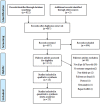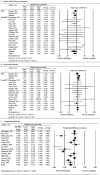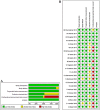Comparison of outcomes between off-pump versus on-pump coronary artery bypass surgery in elderly patients: a meta-analysis
- PMID: 28273208
- PMCID: PMC5378450
- DOI: 10.1590/1414-431X20165711
Comparison of outcomes between off-pump versus on-pump coronary artery bypass surgery in elderly patients: a meta-analysis
Abstract
The aim of this study was to analyze if off-pump coronary artery bypass surgery (CABG) is associated with better treatment outcomes in elderly patients (>70 years of age) than on-pump CABG, using meta-analysis. Medline, PubMed, Cochrane and Google Scholar databases were searched until September 13, 2016. Sensitivity and quality assessment were performed. Twenty-two studies, three randomized control trials (RCTs) and 20 non-RCTs were included with 24,127 patients. The risk of death associated with on-pump or off-pump CABG in the RCTs were similar (pooled OR=0.945, 95%CI=0.652 to 1.371, P=0.766). However, in the non-RCTs, mortality risk was lower in patients treated with off-pump CABG than on-pump CABG (pooled OR=0.631, 95%CI=0.587 to 0.944, P=0.003). No differences were observed between the two treatment groups in terms of the occurrence of 30-day post-operative stroke or myocardial infarction (P≥0.147). In the non-RCTs, off-pump CABG treatment was associated with a shorter length of hospital stay (pooled standardized difference in means=-0.401, 95%CI=-0.621 to -0.181, P≤0.001). The meta-analysis with pooled data from non-RCTs, but not RCTs, found that mortality was lower with off-pump compared with on-pump CABG, and suggested that there may be some benefit of off-pump CABG compared with on-pump CABG in the risk of mortality and length of hospital stay.
Figures






References
-
- Panesar SS, Athanasiou T, Nair S, Rao C, Jones C, Nicolaou M, et al. Early outcomes in the elderly: A meta-analysis of 4921 patients undergoing coronary artery bypass grafting - comparison between off-pump and on-pump techniques. Heart. 2006;92:1808–1816. doi: 10.1136/hrt.2006.088450. - DOI - PMC - PubMed
-
- Mangano CM, Diamondstone LS, Ramsay JG, Aggarwal A, Herskowitz A, Mangano DT. Renal dysfunction after myocardial revascularization: risk factors, adverse outcomes, and hospital resource utilization. The multicenter study of perioperative ischemia research group. Ann Inl Med. 1998;128:194–203. doi: 10.7326/0003-4819-128-3-199802010-00005. - DOI - PubMed
Publication types
MeSH terms
LinkOut - more resources
Full Text Sources
Other Literature Sources
Medical

